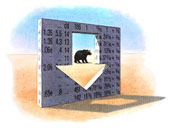Survey Indicates Corporate IT Spending Plummeting
By Ed Oswald | Thursday, November 20, 2008 at 11:46 am
 Get ready for more bad news. Changewave surveyed executives in charge of making IT purchasing decisions, and found that a full 45 percent expected to spend less in November, an all-time high in the eight years that the firm has been conducting the survey. Only 10 percent expect to increase their spending.
Get ready for more bad news. Changewave surveyed executives in charge of making IT purchasing decisions, and found that a full 45 percent expected to spend less in November, an all-time high in the eight years that the firm has been conducting the survey. Only 10 percent expect to increase their spending.
What is most troubling is this: the November period has traditionally been the period when a seasonal bump up is seen in IT expenditures, research director Paul Carlton explains. And its not going to get better anytime soon.
These same execs say their 1st half 2009 budgets will likely be less than their 2nd half 2008 budgets by a substantial margin. 48 percent say it will be less, only 10 percent say more. Nearly half of those surveyed don’t expect a recovery in IT spending until the third quarter of next year.
Drilling down into specifics, the most common IT products being spent less on are PCs (20 percent), and enterprise application software (12 percent). Rounding out the top five are servers, operating system software, and application development programs.
Is there a bright spot? Yes and its in smartphones. Four in ten companies now offer them to employees, up from three in ten a little over a year ago. RIM leads with a 76 percent market share, followed by Apple with 14 percent, and RIM with 11 percent.
Apple is showing the most dramatic gains, up five percent in three months. It’s strength comes from its newfound popularity with small business, where it leads RIM in market share in companies with less than 100 employees.
Carlton points out that it is going to be tough for markets to recover as long as corporations are pulling back on spending. During a conference for analysts, he showed that the S&P 500 and NASDAQ have nearly mirrored the drops in IT spending, which also seems to reinforce the fact that our economy is becoming increasingly technology-driven.
1 Comment
Read more:













November 20th, 2008 at 1:14 pm
Ray Kurtzweil has a movie coming out about the Singularity The Singularity is Near